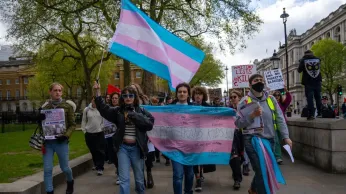
3 hours ago
UK Equalities Watchdog Set to Recommend Ban on Trans People in Single-Sex Public Spaces
READ TIME: 3 MIN.
Reports emerged on August 8 that the UK’s top equalities watchdog, the Equality and Human Rights Commission (EHRC), is preparing to issue new statutory guidance calling for transgender people to be banned from single-sex public spaces—including toilets, changing rooms, and other gendered facilities—regardless of their legal gender recognition status . The leaked draft, reported by The Times and corroborated by other outlets, follows months of debate over the interpretation of the Equality Act in the wake of a landmark Supreme Court decision earlier this year.
Under the expected guidance, all organizations that provide public services—such as hospitals, schools, gyms, government departments, shops, and prisons—would be required to enforce the exclusion of transgender women from female-only spaces. Public bodies would also be allowed to check birth certificates to determine compliance, a move that critics say could result in widespread invasions of privacy and increased discrimination .
The new guidance is a direct response to the UK Supreme Court’s unanimous ruling in April 2025 in the case *For Women Scotland v. The Scottish Ministers* . The Court found that, under the Equality Act, “sex” refers to biological sex assigned at birth, not gender identity. This interpretation effectively overrides existing provisions that had previously allowed transgender people—particularly those with Gender Recognition Certificates—to access single-sex spaces in accordance with their lived gender.
In the wake of the ruling, the EHRC published draft guidance indicating that “women” should be interpreted strictly as biological women for the purposes of single-sex facilities. The final guidance, expected later this month, reportedly maintains this position .
Trans rights advocates and legal experts have criticized the impending guidance as a significant rollback of hard-won protections. The Good Law Project, a UK-based legal charity, has announced plans to challenge the EHRC in court, arguing that the guidance “goes far beyond” what the Supreme Court judgment requires and amounts to a blanket ban that violates the right to privacy and equality in daily life .
Members of the public and advocacy groups have voiced concerns that the changes could force transgender people to avoid public spaces altogether or use facilities that do not correspond with their gender identity, increasing risks to their safety and dignity . Yasmine Ahmed, UK director at Human Rights Watch, described the proposed policy as “severely regressive,” calling for authorities to ensure public services remain “accessible, inclusive, and safe for everyone” .
If enacted, the new guidance would have widespread ramifications for transgender people across the UK. Organizations of all types—including private charities when operating public services—would be required to check legal documents, such as birth certificates, before granting access to single-sex spaces . Critics argue that such measures are not only invasive but may also deter transgender individuals from participating in everyday activities, from shopping and exercising to accessing healthcare and education.
The guidance would also empower service providers to exclude transgender people from single-sex sporting competitions, further limiting opportunities for full participation in public life .
The UK has recognized gender transitions through Gender Recognition Certificates since 2005, allowing individuals to update official documents to reflect their gender identity . However, the recent legal and policy developments mark a departure from this trend, raising alarm among international human rights organizations and LGBTQ+ advocates .
As the UK government and the EHRC move forward with these changes, legal challenges and public protests are expected to continue. LGBTQ+ organizations are urging allies and policymakers to speak out in defense of transgender rights and to ensure that public spaces remain inclusive for all.






